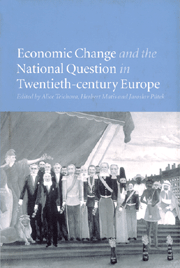Book contents
- Frontmatter
- Contents
- List of figures
- List of tables
- Notes on contributors
- Acknowledgements
- Introduction
- 1 Nationalism and the economic question in twentieth-century Ireland
- 2 Economic aspects of the nationality problem in nineteenth- and twentieth-century Belgium
- 3 The economy as a pushing or retarding force in the development of the German question during the second half of the twentieth century
- 4 Lusatian Sorbs in Germany before the Second World War: the influence of the economy on the national question
- 5 Unequal regional development in Switzerland: a question of nationality?
- 6 The Portuguese national question in the twentieth century: from Spanish threat to European bliss
- 7 From autarky to the European Union: nationalist economic policies in twentieth-century Spain
- 8 The economic background to the Basque question in Spain
- 9 Economic change and nationalism in Italy in the twentieth century
- 10 National integration and economic change in Greece during the twentieth century
- 11 National identity and economic conditions in twentieth-century Austria
- 12 Economic, social and political aspects of multinational interwar Czechoslovakia
- 13 Nationality and competition: Czechs and Germans in the economy of the First Czechoslovak Republic (1918–1938)
- 14 Economic aspects of Slovak national development in the twentieth century
- 15 Economic change and national minorities: Hungary in the twentieth century
- 16 Economic background to national conflicts in Yugoslavia
- 17 Economic differentiation and the national question in Poland in the twentieth century
- 18 Economy and ethnicity in the hands of the state: economic change and the national question in twentieth-century Estonia
- 19 Changing structure and organisation of foreign trade in Finland after Russian rule
- 20 Economic change and the national question in twentieth–century USSR/Russia: the enterprise level
- Index
12 - Economic, social and political aspects of multinational interwar Czechoslovakia
Published online by Cambridge University Press: 01 September 2009
- Frontmatter
- Contents
- List of figures
- List of tables
- Notes on contributors
- Acknowledgements
- Introduction
- 1 Nationalism and the economic question in twentieth-century Ireland
- 2 Economic aspects of the nationality problem in nineteenth- and twentieth-century Belgium
- 3 The economy as a pushing or retarding force in the development of the German question during the second half of the twentieth century
- 4 Lusatian Sorbs in Germany before the Second World War: the influence of the economy on the national question
- 5 Unequal regional development in Switzerland: a question of nationality?
- 6 The Portuguese national question in the twentieth century: from Spanish threat to European bliss
- 7 From autarky to the European Union: nationalist economic policies in twentieth-century Spain
- 8 The economic background to the Basque question in Spain
- 9 Economic change and nationalism in Italy in the twentieth century
- 10 National integration and economic change in Greece during the twentieth century
- 11 National identity and economic conditions in twentieth-century Austria
- 12 Economic, social and political aspects of multinational interwar Czechoslovakia
- 13 Nationality and competition: Czechs and Germans in the economy of the First Czechoslovak Republic (1918–1938)
- 14 Economic aspects of Slovak national development in the twentieth century
- 15 Economic change and national minorities: Hungary in the twentieth century
- 16 Economic background to national conflicts in Yugoslavia
- 17 Economic differentiation and the national question in Poland in the twentieth century
- 18 Economy and ethnicity in the hands of the state: economic change and the national question in twentieth-century Estonia
- 19 Changing structure and organisation of foreign trade in Finland after Russian rule
- 20 Economic change and the national question in twentieth–century USSR/Russia: the enterprise level
- Index
Summary
THE BIRTH OF INDEPENDENT CZECHOSLOVAKIA: ITS STATE AND NATIONALITIES
The idea behind the founding of an independent Czechoslovakia was Thomas Garrigue Masaryk's (1850–1937) liberal-democratic conception of a (putative) Czechoslovak nation consisting of a Czech and a Slovak branch that was to uphold European humanist and democratic traditions. Thus, he believed, Czechoslovakia's existence as a fully fledged nation state would be guaranteed. Intellectually, Masaryk's political programme derived from the philosophy of human existence and history, developed by František Palacký (1798–1876). Masaryk saw the principal tasks and problems of human existence in terms of a concept of humanity rooted in the religious humanism of the Czech Reformation and founded on democracy. These ideals were presented as values implicit in the Czech national historical tradition that had begun with the medieval Hussite revolution and been reborn with the national revival of the nineteenth century. When Masaryk, in 1915, took the final step of linking the humanist tradition of the Czech Reformation to the idea and historical precedent of independent Czech statehood, he promoted the idea of an independent Czechoslovak state of which he became the first president. Among historians, Masaryk's interpretation of Czech history had its supporters (such as Kamil Krofta) and its opponents (such as Jose Pekař).
Brought into being on 28 October 1918, the new state was multinational. A kind of new, miniature Austria-Hungary was created on the ruins of the multinational Habsburg Monarchy.
- Type
- Chapter
- Information
- Publisher: Cambridge University PressPrint publication year: 2000



